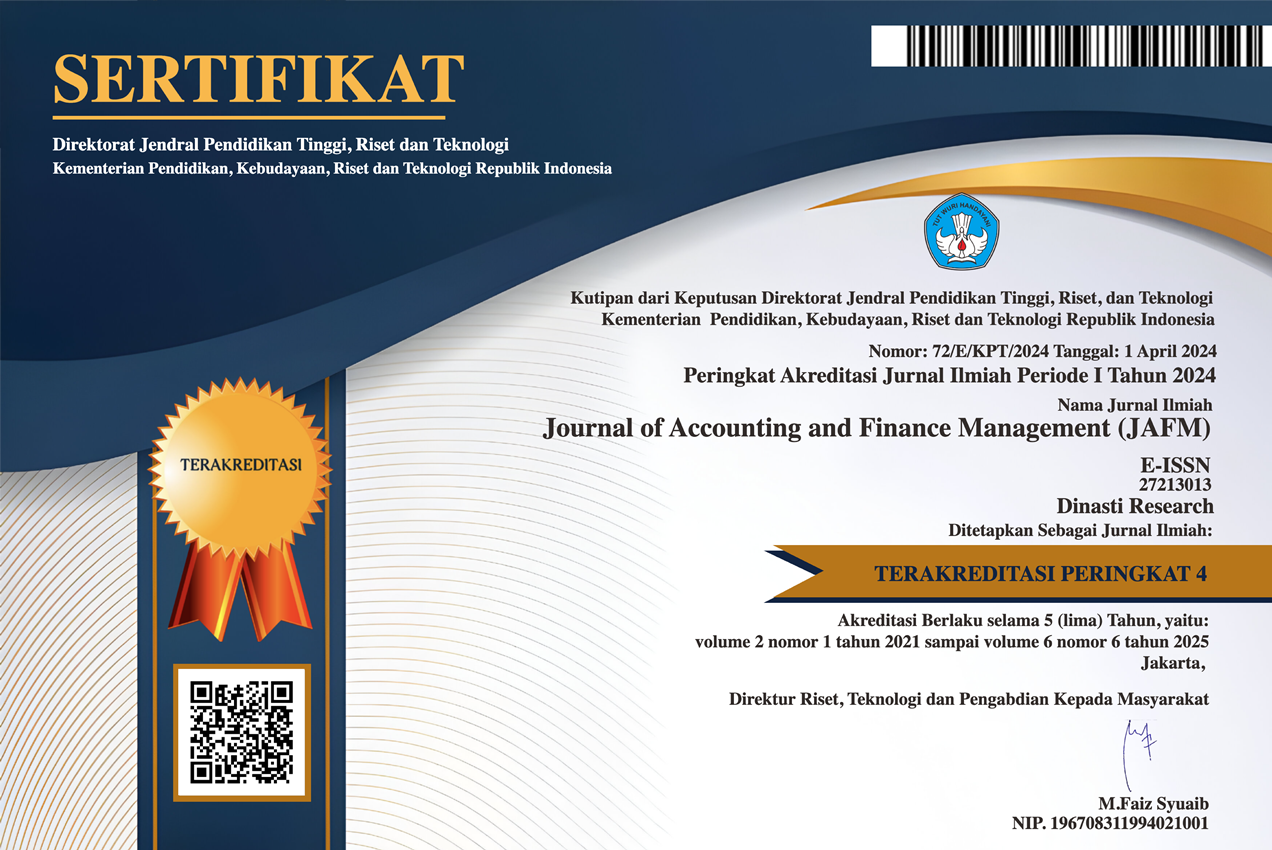The Influence of Discipline and Competence on Employee Performance with Motivation as an Intervening Variable in the Organizational Bureau of the Jambi Provincial Secretariat
DOI:
https://doi.org/10.38035/jafm.v6i4.2433Keywords:
Discipline, Competence, Motivation, Employee PerformanceAbstract
This study aims to analyze the influence of Discipline and Competence on Employee Performance with Motivation as an Intervening Variable in the Organizational Bureau of the Jambi Provincial Secretariat. The method used in this study is a descriptive verification and quantitative method. This study was conducted at the Organizational Bureau of the Jambi Provincial Secretariat with a sample of 61 people. This study uses SPSS 26.0 analysis tools. Descriptively, work discipline, competence, motivation and employee performance are perceived to have been going well. Based on the results of the analysis using SPSS 26.0 software that Discipline has a significant and positive effect on motivation, Competence has a significant and positive effect on motivation, Discipline has a significant effect on employee performance, Competence has a positive and significant effect on employee performance, motivation has a positive and significant effect on employee performance, Discipline has a positive and significant effect on employee performance through work motivation and Competence has a significant and positive effect on employee performance through motivation in the Organizational Bureau of the Jambi Provincial Secretariat.
References
Agustin, N. (2020). Manajemen sumber daya manusia. Jakarta: Prenada Media.
Agustine, P. (2022). Pengaruh kompetensi dan motivasi terhadap kinerja pegawai pemerintah daerah. Jurnal Ilmu Administrasi Publik, 10(2), 45–56.
Dwiyanto, A. (2015). Reformasi Birokrasi Publik di Indonesia. Yogyakarta: Gadjah Mada University Press.
Fahmi, I. (2011). Manajemen Kinerja: Teori dan Aplikasi. Bandung: Alfabeta.
Ferdinand, A. (2014). Metode Penelitian Manajemen. Semarang: Badan Penerbit Universitas Diponegoro.
Ghozali, I. (2018). Aplikasi Analisis Multivariate dengan Program IBM SPSS 25. Semarang: Badan Penerbit Universitas Diponegoro.
Hasibuan, M. S. P. (2017). Manajemen Sumber Daya Manusia. Jakarta: Bumi Aksara.
Hasibuan, M. S. P. (2019). Manajemen: Dasar, Pengertian, dan Masalah. Jakarta: Bumi Aksara.
Herzberg, F. (1996). Work and the Nature of Man. Cleveland: World Publishing.
House, R. J. (1971). A path goal theory of leader effectiveness. Administrative Science Quarterly, 16(3), 321–339.
Lianasari, & Ahmadi, A. (2022). Pengaruh kompetensi terhadap kinerja pegawai sektor publik. Jurnal Administrasi dan Manajemen Publik, 5(1), 23–34.
Mangkunegara, A. A. A. P. (2017). Manajemen Sumber Daya Manusia Perusahaan. Bandung: Remaja Rosdakarya.
Mardiana. (2021). Kompetensi dan pengaruhnya terhadap kinerja aparatur sipil negara. Jurnal Administrasi Publik, 8(2), 67–78.
Mulyadi. (2020). Pengaruh disiplin kerja terhadap kinerja pegawai. Jurnal Ilmu Administrasi Publik, 7(1), 89–99.
Riduwan. (2012). Metode dan Teknik Menyusun Tesis. Bandung: Alfabeta.
Rivai, V. (2014). Manajemen Sumber Daya Manusia untuk Perusahaan. Jakarta: Rajawali Pers.
Robbins, S. P., & Judge, T. A. (2017). Organizational Behavior (17th ed.). Harlow: Pearson.
Sedarmayanti. (2016). Manajemen Sumber Daya Manusia: Reformasi Birokrasi dan Manajemen Pegawai Negeri Sipil. Bandung: Refika Aditama.
Spencer, L. M., & Spencer, S. M. (1993). Competence at Work: Models for Superior Performance. New York: John Wiley & Sons.
Sugiyono. (2017). Metode Penelitian Kuantitatif, Kualitatif, dan R&D. Bandung: Alfabeta.
Sutrisno, E. (2019). Manajemen Sumber Daya Manusia. Jakarta: Kencana.
Umar, H. (2012). Metode Penelitian untuk Skripsi dan Tesis Bisnis. Jakarta: Rajawali Pers.
Wibowo. (2016). Manajemen Kinerja. Jakarta: Rajawali Pers.
Downloads
Published
How to Cite
Issue
Section
License
Copyright (c) 2025 M. Tri Wahyu Sidiq, Saiyid Syeikh, Ali Akbar

This work is licensed under a Creative Commons Attribution 4.0 International License.
Authors who publish their manuscripts in this journal agree to the following conditions:
- The copyright on each article belongs to the author(s).
- The author acknowledges that the Journal of Accounting and Finance Management (JAFM) has the right to be the first to publish with a Creative Commons Attribution 4.0 International license (Attribution 4.0 International (CC BY 4.0).
- Authors can submit articles separately, arrange for the non-exclusive distribution of manuscripts that have been published in this journal into other versions (e.g., sent to the author's institutional repository, publication into books, etc.), by acknowledging that the manuscript has been published for the first time in the Journal of Accounting and Finance Management (JAFM).



























